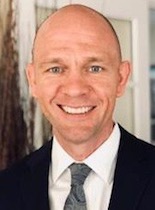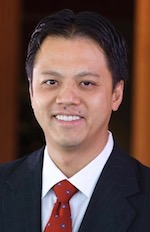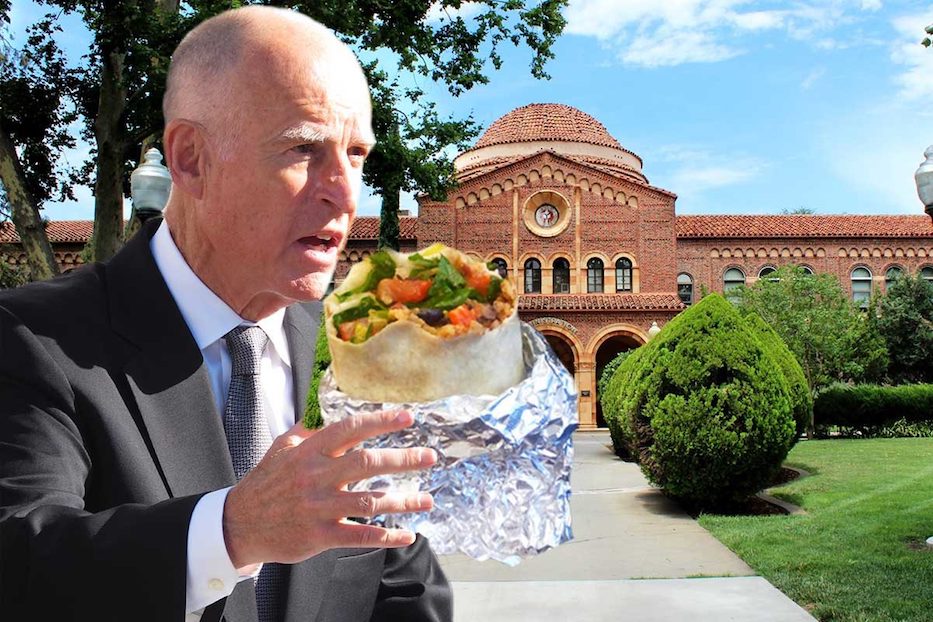Daily Business Report-June 15, 2018
Photo illustration by Robbie Short for CALmatters
Is Jerry Brown’s Chipotle model the
right recipe for California universities?
By Felicia Morello | CALmatters
Like a burrito with too many jalapeños, Gov. Jerry Brown’s recent comments that higher education in California should be more like Chipotle—with a limited menu of courses—gave some people indigestion.
University of California student leaders immediately clapped back with an op-ed in the Sacramento Bee, then followed up by delivering burrito bowls to a state budget negotiation meeting. The real problem with public universities, they argued, wasn’t professors teaching obscure classes on “their pet little projects,” as Brown had said, but that state funding hasn’t kept pace with growing enrollment.
The announcement of a budget deal with sizable boosts for UC and California State University coffers took the focus off Brown’s comments. But all the hullabaloo had us wondering: Was there any truth to the idea that students weren’t graduating in four years because California’s colleges just have…too many courses?
Both UC and CSU say they don’t have data on the total number of unique courses at the universities, or how that’s changed over time.
But Cal State Los Angeles provost Lynn Mahoney told CALmatters that if anything, the number of courses on her campus has contracted in recent years as part of a streamlining of curriculum to ease students’ path to graduation.
The campus has shifted from quarters to semesters, restructured classes and encouraged departments to condense their catalogs, Mahoney said. There used to be 13 different ways to major in music. Now there are six.
“You want a curriculum that can easily be done in four years,” she said.
As for professors teaching too many specialized courses, Jennifer Eagan, president of the university’s faculty union, noted that students “vote with their feet” and classes with low enrollment get cut.
“People aren’t teaching Chaucer seminars with five students in them,” she said.
Still, Brown’s comments echo a national debate about which parts of a college education are essential to support during a time of declining state funding for public universities.
Earlier this year, the University of Wisconsin sent shock waves through the higher ed establishment when it proposed slashing 13 liberal arts majors—including English and political science—from one of its campuses in order to cope with a budget deficit.
California is no Wisconsin: The CSU’s 10-year academic plan calls for adding more than 100 new degree programs in such varied fields as Race and Resistance Studies and Big Data Analytics. (The CSU says campuses add new majors based on workforce needs.)
Yet some academics chafe at the idea of simplifying California’s public university curriculum at the very moment when low-income and first-generation students are enrolling in record numbers.
“My fear is that people don’t want high quality for today’s racially diverse and class-diverse millennial generation. They don’t want to pay for it,” said Christopher Newfield, a UC Santa Barbara English professor and author of The Great Mistake: How We Wrecked Public Universities and How We Can Fix Them.
“It’s more warehousing (students) for four or six years rather than making sure we give them top-level skills.”
Adds Mahoney: “Nobody asks Stanford to be Chipotle. Is it fair that low-income and middle-class students get Chipotle and they get Ruth’s Chris Steak House?”
Ditching specialized, upper-division courses in order to free up faculty for general education could give more students access to “bottleneck” classes that they need to graduate, said Newfield, but at the cost of “dumbing down college rather than making it more accessible. You don’t get to the end of the curriculum.”
Brown spokesperson Brian Ferguson said the governor made his comments “in jest” but was pointing out that students need a clearer and simpler path to graduation than they currently have. He declined to mention any specific classes or types of courses that Brown would eliminate from his ideal menu.
But he pointed to CSU’s new online schedule planner and the California Community Colleges’ guided pathways program—which helps students pick the right courses to meet specific goals—as steps in the right direction.
Those efforts are important because the cost of education has skyrocketed, making students’ time on campus precious, said Lande Ajose, executive director of California Competes, a non-profit that advocates for creating more college graduates to meet the state’s economic needs.
“It was one thing to go sit at a college and think about big philosophical ideas when everything was affordable,” she said. “But when it becomes, ‘Do I go to college or do I buy a house?’ it does throw into bold relief this discussion about what is the purpose of higher education…and how long it takes you.”
“We want folks who are first-generation to go to college and to complete college,” she said. “And if it takes more guided pathways or a Chipotle-like menu to get those kids to complete, I’m willing to go in that direction.”
If Brown wants a first-hand perspective on how to help students graduate faster, he might ask David Gonzalez. Gonzalez, who wants to be a lawyer, attended five Los Angeles-area community colleges to get the prerequisites he needed to transfer to the University of California at Berkeley. He spent a little over three years getting his bachelor’s degree, is now working as a fellow in the California Senate and has advised other community college students through Upward Bound.
Adding more sections of required classes like English and statistics would help, Gonzalez says. But the most important factor, he says, is having a counselor who can give clear advice that relates to your specific situation.
That sounds less like fast food and more like reading a gourmet menu with a waiter by your side to recommend the best dishes. Too fancy for a public university? In a state that has prided itself on the quality of its higher education, maybe not.
This story and other higher education coverage are supported by the College Futures Foundation.
__________________
San Diego Women’s Foundation awards
$200,000 in grants to fund enrichment programs
The San Diego Women’s Foundation awarded $200,000 to fund six innovative enrichment programs during its 18th annual grants program event held at the Cygnet Theatre in May.
This year’s grantees selected through a vetting process and a final vote by all 215 SDWF members include:
- Boys to Men Mentoring Network Inc. – Boys to Men Mentoring Program ($25,000)
- International Rescue Committee – Refugee Girls Academy ($50,000)
- Survivors of Torture, International – Refugee Student Enrichment Activities ($25,000)
- Tariq Khamisa Foundation – Restorative Workshops ($25,000)
- The AjA Project – Girls-Eye View ($35,000)
- The David’s Harp Foundation Inc. – Student Studio ($30,000)
The evening celebrated the power of women in philanthropy and showcased the critical work of SDWF’s nonprofit

partners. Since SDWF’s founding in 2000, the organization has granted $3.4 million to benefit underserved communities across the region.
Executive Director Katie Sawyer announced that SDWF’s next grants cycle will fund programs to combat human trafficking in San Diego County. San Diego is among the top regions in the country for sex and labor trafficking, and SDWF anticipates providing at least $200,000 next year to address the issue.
__________________
San Diego Community College District
names new director of legal services

Ljubisa Kostic, a respected employment litigation lawyer, has been hired by the San Diego Community College District as its new director of legal services and equal employment opportunities. In his new post, , which begins on Oct. 1, Kostic will be responsible for providing legal counsel for the chancellor, cabinet, board of trustees and district administrative staff, in addition to ensuring the district is adhering to equal employment opportunities under state and federal law and district policy.
Kostic became a partner at the San Diego law firm of Artiano Shinoff in 2008 and became owner of the firm in 2016. He has significant experience representing public entities, with a focus on community college districts. Born in Belgrade, Serbia (then Yugoslavia), Kostic began his career with the Las Vegas law firm of Lionel, Sawyer & Collins, one of Las Vegas’ oldest, largest and most prestigious corporate firms. He has been associated with Artiano Shinoff since 2003.
__________________
Pew selects scientists to investigate
fundamental biomedical questions
Three San Diegans are among 22 early-career researchers named to the 2018 class of Pew scholars in the biomedical sciences by the Pew Charitable Trusts. The scholars will receive four-year grants to advance their explorations of biological mechanisms underpinning human health and disease.
The local researchers are:
- Matthew D. Daugherty, Ph.D, UC San Diego: Daugherty will explore how organisms evolve resistance to infections and how pathogens can subvert those defenses.
- Enfu Hui, Ph.D., UC San Diego: Hui will research the ways the immune system can be used to fight cancers.
- Saket Navlakha, Ph.D., Salk Institute for Biological Studies: Navlakha will investigate how collections of molecules, cells, and organisms process information to solve computational problems that are central to survival.
“These scientists have shown the boldness and creativity that drives great discoveries, and Pew’s unrestricted support will help them follow the facts wherever they lead,” said Rebecca W. Rimel, president and CEO of The Pew Charitable Trusts. “We’re proud to invest in this gifted group at a pivotal stage in their careers when funds to pursue new concepts and methods can be scarce.”
The scholars—all of whom have held assistant professor positions for three years or less—enter a vibrant community of researchers who have received awards from Pew since 1985. Current scholars meet annually to discuss their research, and exchange ideas with peers in fields outside of their own.
__________________

Kona Kai Resorts & Spa opens its
$13 million expansion project
Kona Kai Resort & Spa on Shelter Island has officially opened its newly-expanded luxury suites, Marina View Terrace, and Paloma Pool and Bar, a dedicated adult pool. Kona Kai completed a $14 million renovation in July 2015 and the recently revealed expansion project was a $13 million project.

“We are thrilled to unveil the highly-anticipated addition of our new luxury coastal suites and pool area,” said Scott Colee, creative director of Noble House Hotels & Resorts. “After a sensational transformation, the next chapter of Kona Kai presents a stunning paradise with an abundance of activities around the island.”
Kona Kai Resort & Spa’s newest suites feature hand-hewn wooden ceiling beams, spa-inspired bathrooms with dual vanities, deep soaking tubs, rainfall showers and oversized balconies to enjoy ocean breezes and take in the sunset. The newly-added Paloma Pool and Bar is an exclusive pool area for guests ages 18 and up. Guests can enjoy poolside lunch or dinner service featuring California Coastal specialties while gazing at sparkling ocean and marina views in chic cabanas with 75 lounge chairs on the sunny pool deck
__________________
General Atomics Awarded
$23 million Air Force Contract
General Atomics Aeronautical Systems Inc. has been awarded a $22,907,561 contract for MQ-9 Reaper radar work. Work will be performed in Poway and is expected to be complete by June 31, 2020. The Air Force Life Cycle Management Center, Wright-Patterson Air Force Base, Ohio, is the contracting activity.
__________________
Personnel Announcements
Alan Tse to join JLL as general counsel

JLL has appointed Alan Tse, general counsel, corporate secretary and an executive committee member at Petco in San Diego, as its global general counsel and corporate secretary effective June 27. A leader with extensive experience in companies with global operations, Tse he will be responsible for JLL’s legal and compliance functions. He will succeed Mark Ohringer, who is retiring from JLL, and will be located in the company’s Chicago office.
Prior to joining Petco, Tse served as general counsel and an executive committee member at Churchill Downs, following a role as general counsel at LG Electronics Mobilecomm.
Tse is also co-founder and a board director of the Asian American Legal Foundation, and a board director and executive committee member of the Association of Corporate Counsel (ACC). He earned a J.D. from Harvard Law School and a B.A. in Economics and Political Science from the University of California at Berkeley.
__________________
Ron Coughlin named new CEO of Petco
Petco Animal Supplies Inc. has named Ron Coughlin as its new chief executive officer. Coughlin joins the company from HP Inc., where he served for 11 years, most recently as president of personal systems. He will begin in this role on June 18.
Coughlin, a consumer products and technology industry veteran with over 15 years of C-suite executive experience, spent the last four years leading HP’s Personal Systems segment, a $33 billion global business that offers consumer and commercial products and services. Previously, he was SVP of Consumer PCs, SVP of LaserJet Hardware and Commercial Document Services and Solutions, and SVP of sales, strategy, and marketing at HP. Prior to joining HP, Coughlin spent 12 years at PepsiCo in a range of senior executive roles, including chief marketing officer of PepsiCo International Beverages. In that capacity, he was responsible for marketing activities across Pepsi, 7 Up, Gatorade, and Tropicana in all markets outside of the U.S.



